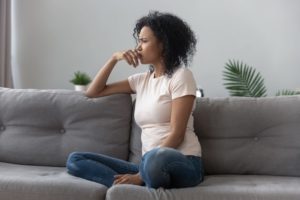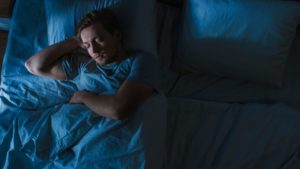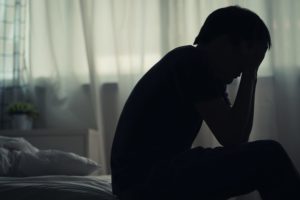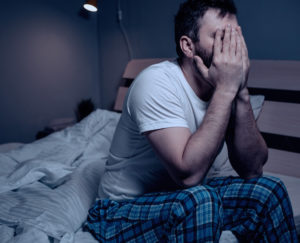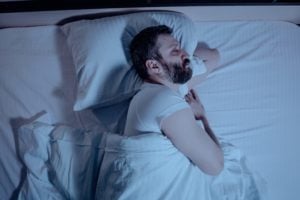When you buy through our links, we may earn a commission. Products or services may be offered by an affiliated entity. Learn more.
Grief and Its Effect on Sleep
While grief is a universal experience, the way grief is processed is unique to each individual. The grieving process takes time, and it looks different for each person. However, one of the most [common complaints of the bereaved is trouble sleeping. Mental health and sleep are closely connected, and the painful toll of losing a loved one can wreak havoc on both.
What Is Grief?
Most people experience five distinct stages of grief: disbelief, bargaining, anger, depression, and acceptance. These stages don’t necessarily appear in a linear pattern, and it’s common to experience these stages in different waves of intensity throughout the grieving process. The intensity of the grief gradually lessens with time, and by around six months, a majority of people are able to accept the loss and integrate it into their lives.
When Does Grief Become Complicated Grief?
For 10% to 15% of grievers, however, the intensity of grief does not lessen. These individuals continue to experience intense symptoms of grief, even after six months have passed. This is known as complicated grief, prolonged grief disorder, or traumatic grief. Symptoms include the following:
- Recurrent and intrusive emotional pain
- Preoccupation with and persistent longing for the deceased
- Anger over the person’s death
- Avoidance of things that remind them of their loved one
- Loss of trust in or detachment from others
- Emotional numbness
- Loneliness
- Survivor’s guilt
- A sense of having lost part of one’s self
Complicated grief is distinct from mental health disorders like depression and anxiety, although it can often coexist with depression and post-traumatic stress disorder (PTSD).
A person’s risk of developing complicated grief doubles when they’ve experienced the loss of a close loved one, such as a child or spouse. Women, older adults, individuals with a lower income, and those who have lost someone to cancer, are also at an increased risk of experiencing complicated grief.
Looking to improve your sleep? Try upgrading your mattress.
How Grief Affects Sleep
Sleep, or lack of it, is a common complaint of grief. People who have more grief symptoms are more likely to take longer to fall asleep, wake up for periods of time after falling asleep, and spend a significant portion of their time in bed awake rather than asleep.
People who are bereaved are also more likely to suffer from middle insomnia, or difficulty going back to sleep after waking up in the middle of the night. Thoughts of their loved one keep them from falling asleep in the first place. Then, once they do fall asleep, they have trouble sleeping through the night due to dreaming about the deceased.
In studies of individuals with poor sleep, researchers often rely on the Pittsburgh Sleep Quality Index (PSQI) to assess sleep quality. This self-administered questionnaire results in a score ranging from 0 to 21, with lower numbers indicating better sleep. A PSQI score of 5 or more indicates “poor sleep.” Individuals with complicated grief average a PSQI score nearly double that, at 9.44.
Sleep and Grief: A Bidirectional Relationship
Poor sleep quality is not a diagnostic feature of complicated grief, but it may increase one’s risk of developing complicated grief. A growing number of studies show that sleep disturbance often accompanies grief, and that the sleep and grief share a bidirectional relationship.
As many as 91% of individuals with complicated grief report sleep problems. Forty-six percent say they have trouble sleeping, specifically due to their grief, at least three times per week.
At the same time, those who have sleep complaints during bereavement — including short sleep, trouble falling asleep, and waking up during the night — are more likely to develop complicated grief. In other words, grief not only disrupts sleep, but poor sleep can make the grieving process harder.
For example, one study of bereaved college students found that those suffering a loss had a significantly higher rate of insomnia than their non-grieving peers. More than 1 in 5 of the bereaved experienced insomnia, compared with only 1 in 6 of the non-grieving students. Among the grieving students, those with insomnia had more severe symptoms of complicated grief than those whose sleep wasn’t disrupted.
Spousal Bereavement and Sleep
Over 800,000 American seniors lose their spouse or partner each year. Disturbed, poor quality sleep is a common experience for these individuals. The worse their grief, the worse their sleep.
Losing a partner can be particularly impactful on sleep, since the widow or widower may have shared their bed with that loved one for decades. When their partner dies, everything about going to sleep — from bedtime routines to the bed itself — can feel different, empty, and less safe. As a result, it’s more challenging to fall asleep and sleep soundly.
Losing a spouse later in life carries other risks, including an increased risk of nursing home placement and medication use. Women who become widowed are more than twice as likely to use hypnotics to help themselves sleep. When those who have lost their spouse develop complicated grief, they have an increased risk of developing cancer or high blood pressure within the next two years.
Poor sleep is associated with poorer health outcomes at any age. For older individuals, poor sleep can double the risk of death.
Additional Comorbidities and Sleep
Around 1 in 4 individuals who have lost a spouse develop major depression, which can last for up to two years after their loss. Individuals with complicated grief and comorbid depression tend to suffer from worse sleep quality. Both the severity of their depression as well as their grief independently predict poor sleep.
Grief is also associated with changes in physical health, which may exacerbate sleep problems and in turn intensify the grieving process. For example, 43% of individuals experience a loss of appetite while grieving. Being in poorer physical health at the time of the loss can increase the risk of developing complicated grief and major depression, and the associated sleep problems.
Due to the extreme stress of losing a loved one, individuals who have experienced the death of a spouse are also more likely to have increased levels of inflammation compared to non-bereaved individuals with disturbed sleep. This type of inflammation may increase their risk of cardiovascular disease.
The loss of a loved one often results in serious changes to lifestyle, such as a loss in financial security or safety, which can also disrupt sleep quality. Grieving individuals may exercise less and participate in fewer social activities, both of which can lower the quality of their sleep. Sedentary lifestyles are associated with poor sleep, and loneliness alone can be a predictor of poor sleep.
Treatments for Grief and Related Sleep Issues
Poor sleep can worsen outcomes for individuals with grief. By the same token, good sleep can help individuals cope with the grieving process. To alleviate symptoms, therapeutic approaches targeting both grief and sleep issues are often recommended.
Therapeutic Treatments for Grief
Treatments for grief may include a mix of psychotherapy with medication. Many people experiencing a loss are prescribed hypnotic medications to relieve symptoms of insomnia and complicated grief. However, this approach can put grieving older adults at greater risk of nighttime falls and injury.
Antidepressants can be another effective treatment, especially when combined with complicated grief therapy (CGT). In CGT, a therapist uses specific procedures to help the individual learn to regulate the emotions stemming from their grief. Individuals who undergo CGT in addition to taking an antidepressant experience better sleep than those taking an antidepressant alone. Their sleep problems do not disappear, but improve significantly. In one study, the percentage of individuals who had trouble sleeping at least 3 times per week due to their grief dropped from 49% to 15%.
Both cognitive behavioral therapy and interpersonal psychotherapy have been shown to relieve the symptoms of complicated grief. However, some studies indicate that despite improving the symptoms of complicated grief, these treatments do not always resolve sleep quality issues. For example, one Dutch study found that those who underwent cognitive behavioral therapy for complicated grief reported fewer sleep complaints after therapy. However, over half still had more sleep complaints than the average person.
To relieve the sleep problems associated with grief, additional treatments may be recommended, such as cognitive behavioral therapy specifically for insomnia.
Cognitive Behavioral Therapy for Insomnia
Cognitive behavioral therapy for insomnia (CBT-I) is considered to be a safe and effective treatment for insomnia. A typical course of this treatment includes up to eight weekly, hour-long sessions with a therapist in which the patient unpacks the unhealthy thoughts and behaviors they have around sleep and learns to replace them with new strategies. They may learn better sleep hygiene habits, such as:
- Making the bedroom as dark, cool, and quiet as possible
- Avoiding electronics use at least one hour before bed
- Limiting napping during the day
- Avoiding alcohol and caffeine past the early afternoon
- Following a daily exercise routine
Two other aspects of CBT-I include stimulus control and sleep restriction, which have proven to be particularly effective:
- Stimulus control focuses on helping the individual associate their bedroom exclusively with sleep and relaxation. The individual is instructed to only use the bed for sleep, and to get out of bed and leave the room if they lie awake for more than 10 minutes.
- Sleep restriction focuses on following a strict sleep schedule every day, based on the individual’s typical time spent asleep, give or take 30 minutes. For example, an individual sleeping six hours will only be allowed to stay in bed for 6.5 hours. This helps reinforce the bed as a place only for sleep, while helping the person adjust to a consistent sleep schedule.
Grieving takes time, but there are people who can help. If your grief symptoms are becoming more intense and interfering with your sleep, speak to your doctor.

Still have questions? Ask our community!
Join our Sleep Care Community — a trusted hub of sleep health professionals, product specialists, and people just like you. Whether you need expert sleep advice for your insomnia or you’re searching for the perfect mattress, we’ve got you covered. Get personalized guidance from the experts who know sleep best.
References
16 Sources
-
Maciejewski, P. K., Zhang, B., Block, S. D., & Prigerson, H. G. (2007). An empirical examination of the stage theory of grief. JAMA: The Journal of the American Medical Association, 297(7), 716–723.
https://pubmed.ncbi.nlm.nih.gov/17312291/ -
Monk, T. H., Germain, A., & Reynolds, C. F. (2008). Sleep disturbance in bereavement. Psychiatric Annals, 38(10), 671–675.
https://pubmed.ncbi.nlm.nih.gov/20179790/ -
Milic, J., Saavedra Perez, H., Zuurbier, L. A., Boelen, P. A., Rietjens, J. A., Hofman, A., & Tiemeier, H. (2019). The longitudinal and cross-sectional associations of grief and complicated grief with sleep quality in older adults. Behavioral Sleep Medicine, 17(1), 31–40.
https://pubmed.ncbi.nlm.nih.gov/28107032/ -
Szuhany, K. L., Young, A., Mauro, C., Garcia de la Garza, A., Spandorfer, J., Lubin, R., Skritskaya, N. A., Hoeppner, S. S., Li, M., Pace-Schott, E., Zisook, S., Reynolds, C. F., Shear, M. K., & Simon, N. M. (2020). Impact of sleep on complicated grief severity and outcomes. Depression and Anxiety, 37(1), 73–80.
https://pubmed.ncbi.nlm.nih.gov/31916662/ -
Kersting, A., Brähler, E., Glaesmer, H., & Wagner, B. (2011). Prevalence of complicated grief in a representative population-based sample. Journal of Affective Disorders, 131(1-3), 339–343.
https://pubmed.ncbi.nlm.nih.gov/21216470/ -
Hardison, H. G., Neimeyer, R. A., & Lichstein, K. L. (2005). Insomnia and complicated grief symptoms in bereaved college students. Behavioral Sleep Medicine, 3(2), 99–111.
https://pubmed.ncbi.nlm.nih.gov/15802260/ -
Buysse, D. J., Hall, M. L., Strollo, P. J., Kamarck, T. W., Owens, J., Lee, L., Reis, S. E., & Matthews, K. A. (2008). Relationships between the Pittsburgh Sleep Quality Index (PSQI), Epworth Sleepiness Scale (ESS), and clinical/polysomnographic measures in a community sample. Journal of Clinical Sleep Medicine, 4(6), 563–571.
https://pubmed.ncbi.nlm.nih.gov/19110886/ -
Germain, A., Caroff, K., Buysse, D. J., & Shear, M. K. (2005). Sleep quality in complicated grief. Journal of Traumatic Stress, 18(4), 343–346.
https://pubmed.ncbi.nlm.nih.gov/16281231/ -
National Heart, Lung, and Blood Institute. (n.d.). Sleep deprivation and deficiency., Retrieved April 5, 2021, from
https://www.nhlbi.nih.gov/health-topics/sleep-deprivation-and-deficiency -
Utz, R. L., Caserta, M., & Lund, D. (2012). Grief, depressive symptoms, and physical health among recently bereaved spouses. The Gerontologist, 52(4), 460–471.
https://pubmed.ncbi.nlm.nih.gov/22156713/ -
Chirinos, D. A., Ong, J. C., Garcini, L. M., Alvarado, D., & Fagundes, C. (2019). Bereavement, self-reported sleep disturbances, and inflammation: Results from Project HEART. Psychosomatic Medicine, 81(1), 67–73.
https://pubmed.ncbi.nlm.nih.gov/30300238/ -
Yang, Y., Shin, J. C., Li, D., & An, R. (2017). Sedentary behavior and sleep problems: A systematic review and meta-analysis. International Journal of Behavioral Medicine, 24(4), 481–492.
https://pubmed.ncbi.nlm.nih.gov/27830446/ -
Griffin, S. C., Williams, A. B., Ravyts, S. G., Mladen, S. N., & Rybarczyk, B. D. (2020). Loneliness and sleep: A systematic review and meta-analysis. Health Psychology Open, 7(1), 2055102920913235.
https://pubmed.ncbi.nlm.nih.gov/32284871/ -
Wetherell J. L. (2012). Complicated grief therapy as a new treatment approach. Dialogues in Clinical Neuroscience, 14(2), 159–166.
https://pubmed.ncbi.nlm.nih.gov/22754288/ -
Germain, A., Shear, K., Monk, T. H., Houck, P. R., Reynolds, C. F., Frank, E., & Buysse, D. J. (2006). Treating complicated grief: Effects on sleep quality. Behavioral Sleep Medicine, 4(3), 152–163.
https://pubmed.ncbi.nlm.nih.gov/16879079/ -
Boelen, P. A., & Lancee, J. (2013). Sleep difficulties are correlated with emotional problems following loss and residual symptoms of effective prolonged grief disorder treatment. Depression Research and Treatment, 2013, 739804.
https://pubmed.ncbi.nlm.nih.gov/23956852/


